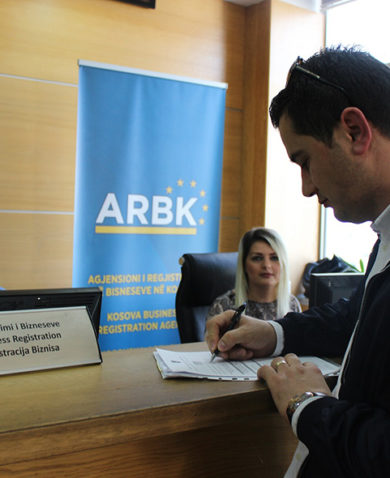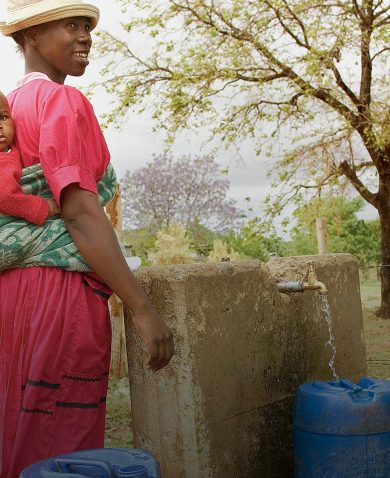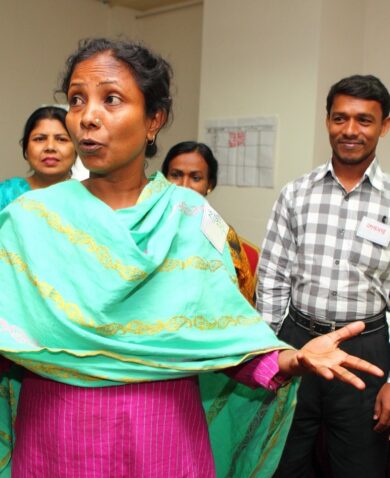
To Respond to the Venezuelan Migration Crisis, Let’s Also Tap the Private Sector
September 5, 2019 | 4 Minute ReadAs Venezuelan migrants navigate challenges in host countries, the private sector must play an active role in maximizing their economic opportunities.
Globally, new momentum is building for the private sector’s participation in alleviating migration crises worldwide and supporting migrants’ and refugees’ integration. From investing in migrant-owned businesses to engaging a migrant workforce or securing resources for optimal basic service delivery for migrants and host communities, private sector engagement offers unique avenues for helping to solve migration crises, ensuring community resilience, stimulating local economies, and building livelihoods. The private sector, for example, has catalyzed many integration solutions in response to the Syrian or European migration crises. Such efforts could be beneficial in Latin America to address the development challenges resulting from the large, rapid, and forced migration of 4,054,870 Venezuelans, of which 1,298,300 are in Colombia; 806,875 in Peru, and 263,000 in Ecuador. With migration analysts predicting 8 million Venezuelan refugees by 2020, the time to engage the private sector is now. Let’s see how the private sector can boost Venezuelan migrants’ integration while securing host countries’ development in Latin America.
Build migrants’ capacity to become more productive and resilient economic actors.
The most recent wave of Venezuelan migrants often resorts to informal economic work by necessity. In Peru and Colombia, respectively, 92.1 percent and 70 percent of Venezuelan migrants are informal workers who are in turn frequently threatened by labor exploitation. To become more resilient and productive economic actors, many Venezuelan migrants are actively acquiring entrepreneurial skills inspired by recent success stories in the gastronomic sector in Peru, for example. Local organizations and institutions — such as Unión Venezolana en Perú or the Chamber of Commerce of Bogotá in Colombia — are already setting up professional training to help migrants gain the skills to succeed. The private sector can carry out similar interventions, as illustrated by the Human Safety Net for Refugee Start-Ups Program launched in 2017 by the Generali Group to help refugees define their projects through training, mentoring, and volunteering skills to support them in creating their own businesses in France. Similarly, it’s imperative to conduct further training to help Venezuelans acquire new skills to boost employability, such as the training program conducted in Argentina with Manpower, a leading global workforce solutions company.
Take the risk: invest in migrant entrepreneurs.
Opportunities exist to leverage new private sector-led initiatives to address migration crises elsewhere, embracing a paradigm shift that encourages refugee or migrant lens investing. Philanthropic capital, impact investors, and corporations can offer myriad solutions to advance Venezuelan migrants’ economic integration by supporting entrepreneurship, catalyzing startups, or scaling up established businesses led by these migrants and refugees. The models set up by fund managers and platforms, such as OneWayVentures — a Boston-based venture firm created in 2017 by a group of immigrants that invests in the technology startups of founders shaped by their migration experience — or the Tent Partnership for Refugees created by Chobani’s CEO, can instill new ideas in the context of the Venezuela migration crisis. Although many funders and investors are interested in responding to the Venezuela migration crisis, they are understandably still shy to invest in Venezuelan migrants. Migrant startups risk not obtaining collateral, lack reliable credit histories, and may not be able to legally incorporate in the countries in which they operate. However, investors will find that the benefits of migrants’ successful economic integration and a more inclusive, productive business climates in host countries ultimately outweigh these risks.
Facilitate migrants’ access to capital through the use of microfinance.
The social, economic, and political contexts in Colombia, Ecuador, and Peru are often complex. Private, public, and civil actors understand the challenges and benefits of the Venezuelan migration crisis differently. Inevitably, structural and political constraints hinder Venezuelan migrant entrepreneurs’ access to finance and capital in Peru or Ecuador — or even close doors to employment altogether. To access traditional banking services, Venezuelans must show proof of legal status and possess proper documentation. This is particularly challenging for Venezuelan migrants who often leave their country without valid passports or visas, given the challenges of obtaining such documents prior to departure. Even when they do have the required documentation, financial service providers sometimes perceive Venezuelan migrants as risky customers with poor repayment rates. To overcome this, microfinance institutions — which actually flourish in Peru and Colombia, where many Venezuelan migrants now live — can facilitate their access to financial and non-financial services. The program sponsored by the United Nations High Commission for Refugees and the Swedish International Development Cooperation Agency, with the Grameen Crédit Agricole Foundation, illustrates the benefits of partnerships between foreign aid agencies and private sector foundations to boost the use of microfinance for the economic integration of migrants in Uganda and Jordan. In fact, access to microfinance to boost migrant entrepreneurship has been widely used in other contexts, and important lessons — e.g., bolstering community-led finance support programs alongside legal and policy efforts — can help key actors identify best approaches in host countries across South America.
Tap a productive Venezuelan workforce.
Potential employers in host countries grapple with structural barriers and initial fears of hiring Venezuelan migrants, including uncertainty about the rules governing migrants’ labor rights; doubts about their skills, qualifications, or foreign diplomas; or a skeptical public opinion. In fact, the business community and political actors have yet to understand the potential of engaging a diverse Venezuelan migrant workforce at the micro- and macro-economy levels. These actors can and should leverage migrant talent, tapping a large number of highly skilled or specialized Venezuelans, while taking advantage of voluntary geographic distribution to close workforce gaps in key sectors or locations, for example. Because the Venezuelan migration crisis is so recent, a change in attitudes towards Venezuelans across Latin America is slow. A few businesses — such as Natura in Chile, in partnership with the International Organization on Migration — are actively promoting migrant-centered hiring practices. Meanwhile, a few governments are already spearheading positive labor integration of Venezuelans. Colombia, for example, is in the process of enabling Venezuelans’ economic integration through facilitating access to special work permits, establishing decent salary thresholds, and ensuring access to welfare.
Ultimately, to be successful, the economic integration of migrants is contingent on stronger political will and the private sector’s ability to become a more active advocate for policy and regulatory transformations, such as formulating a cohesive strategy on entrepreneurship for migrants, optimizing the regulatory environment, enhancing entrepreneurial education and skills, and facilitating technology exchanges. These cumulative efforts could enable productive business climates that maximize Venezuelan migrants’ knowledge, skills, and unique disposition to build strong livelihoods and support host countries’ economies.
Posts on the blog represent the views of the authors and do not necessarily represent the views of Chemonics.





































































